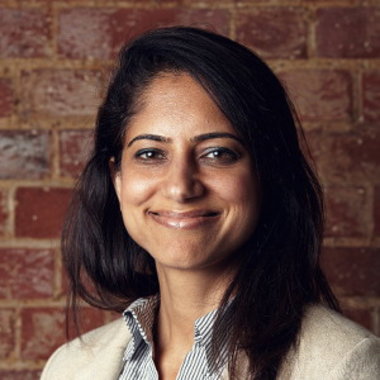21 October 2019
Five questions with Dr Rachna Chowla, one of King’s Health Partners new Joint Directors of Clinical Strategy. Hear about how Rachna will lead on primary care collaborations to improve outcomes for local people.
Tell us about yourself
I am most definitely a GP at heart. I currently work at Albion St GP Practice in Rotherhithe and am also one of the clinical leads for Clinical Effectiveness Southwark. I have worked in Albion St Practice on and off for more than 10 years and during my time away from Practice I have done lots of different things – an MBA, worked in Milan for a big pharma company in Strategy and Marketing, a health-tech start-up in London, research for the Health Foundation on Innovation in healthcare, and work with The King’s Fund on Compassionate Leadership and Innovation. In between all this, I also developed my love for poetry. I’ve published a collection of my poems and am working (very slowly) on my second.
My journey with King's Health Partners in some ways started more than 20 years ago as I trained at King’s College London. Rather poignantly my admission letter to medical school, which my parents have still kept safe at home, was signed by Prof John Moxham, King’s Health Partners current Director of Value. My training took place across King's Health Partners and most of my hospital jobs have also been here, so the trusts and campuses all feel pleasantly familiar. In the last two years, through work at Clinical Effectiveness Southwark, I have worked with King's Health Partners supporting the Vital 5 programme and participated in the King's Health Partners annual conference by running workshops.
What does your new role with King’s Health Partners involve?
Working alongside the other Joint Directors of Clinical Strategy, Irem and Natasha, my role will be to understand how, as an Academic Health Sciences Centre, King's Health Partners can work with and support primary care. Whilst it feels that the potential scope for collaboration is huge, I am also cognizant of the current changes within primary care, for example, Primary Care Networks being set up and the merging of Clinical Commissioning Groups (CCGs) into one Sustainability and Transformation Partnership (STP) and how this can feel quite unsettling on the ground.
So right now we are in listening and understanding mode. Talking to lots of colleagues within the South East London primary care ecosystem. Beginning to understand from their perspective how things are, what their needs are, how these might change and what the synergies might be between us. One area of work will be to further explore how we could implement the Vital 5 within primary care. Responding to worsening health inequalities is a key national and local priority and I believe the Vital 5 programme can play an important role in meeting this challenge and improving outcomes for our local population.
I am also keen to meet colleagues within the trusts and University to learn how through this role we can build closer links between us all.
How do you think King’s Health Partners can make a difference in this area?
I think that tapping into the world-class research, education and clinical practice that takes place across the partnership will be key.
This model of joined-up partnership working, reaching out beyond just healthcare, could help to drive further collaboration and actively involve our system partners so that collectively, we can think about and do something about, major challenges such as health inequalities.
What are your top priorities in your first three-to-six months, and the longer-term?
Over the next few months, I will be meeting lots of people and listening with fascination (as Nancy Kline says) to understand things from their perspective and to understand more about joint opportunities.
I would like to learn from the experience of other organisations on how they have engaged with primary care. I would love to talk more with system thinkers like Guy’s and St Thomas’ Charity who are starting to focus on Urban Health, or the Health Foundation who have done so much to bring awareness of the Social Determinants of Health to the fore. As the conversations start, I am sure there will be lots more to learn and uncover. If you asked me in a year, the answer might be quite different to this!
In the longer term, I think it will be really interesting to see what impact we could bring about by being part of the system and what could happen to health inequalities if we all worked together and the Vital 5 were measured and acted upon for an entire population.
I’m also personally very interested in exploring topics like teaching innovation in healthcare for medical students, encouraging conversations on compassion cultivation and compassionate leadership, and bringing arts into my work. I love poetry and have shared poems with patients (sometimes my own) as I find they can be truly cathartic for both. I was delighted to see a recent poetry exhibit at South London and Maudsley and would love to explore how we can build on initiatives like that.
What is the best advice you’ve ever been given?
This must be from the compassionate leadership work I have been involved with. Taking the time to notice and listen to what is happening for people around us, taking the time to understand, and understand deeply enough to have an empathic response, which then leads to taking intelligent action to help. I think this should be applied to ourselves, as much as we would think about using it to help others.
Read more about Value Based Healthcare at King's Health Partners.





